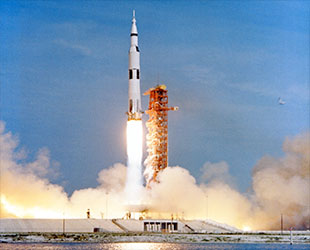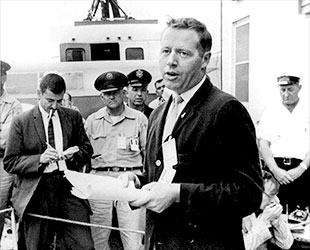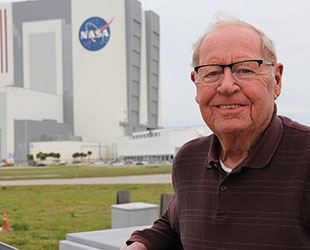June 11, 2015 — "Lift-off! We have a lift-off... 32 minutes past the hour. Lift-off on Apollo 11."
It was with those words, on the morning of July 16, 1969, that Jack King – NASA's "Voice of Apollo" – gave start to the first mission to land men on the moon.
King, who served for 12 years as the space agency's chief of public information, spanning the Mercury, Gemini, and Apollo programs, died on Thursday (June 11). He was 84.
"Jack helped establish the original systems to ensure the media received timely and accurate information about both the early human flight programs and unmanned missions," said Hugh Harris, a retired director of public affairs at the Kennedy Space Center in Florida.
As chief, King was the "voice of launch control" for almost every U.S. manned spaceflight from the Gemini 4 mission 50 years ago this month to the fourth moon landing, Apollo 15. He came to have one of the most recognizable voices in the world as a result of his Apollo 11 countdown.
The original broadcast of that launch and the subsequent replays over the past four decades have reached the ears of more than a billion people, according to NASA.

"Lift-off of Apollo 11" at 9:32 a.m. EDT on July 16, 1969. (NASA) |
King was recruited by the space program in 1960 based on his work as a journalist for the Associated Press. From 1958 to 1959, King led the AP's Cape Canaveral bureau, reporting about what were then mostly classified military rocket launches.
"My first challenge [as the manager of press operations at NASA] was preparing for the onslaught of media, once the manned launches started," King told author Billy Watkins for the book, "Apollo Moon Missions: The Unsung Heroes" (Bison Books). "We had to build our whole press site. We had to work out arrangements to get a television feed for the press. This may all sound easy now but we developed [it] from scratch."
He soon found though, that his work concerned as much NASA's own employees as it did the media.
"I had to do about as much public relations work inside as I did outside NASA," King recalled. "The astronauts would ask me, 'Why should I help them? All they do is blast us!' I do not want to blow this out of proportion, because all of them were not like that. They just did not see the need of being interviewed by the media. They were test pilots and weren't used to a lot of attention."
Not long after Apollo 11, King was promoted to director of public affairs for NASA's Manned Spacecraft Center (now Johnson Space Center) in Houston. There he had a wider responsibility than just media service.

Jack King briefs the news media on postponement of the launch of Mercury Redstone-3 due to unfavorable weather. (NASA) |
He directed a staff that also included education outreach, exhibit programs, astronaut appearances and community and inter-governmental relations. He was also a member of the three-man team that negotiated the joint information plan for the Apollo-Soyuz Test Project, the first joint flight between the United States and the former Soviet Union, resulting in the first live television coverage of a Russian launch and Soyuz landing at the end of the 1975 mission.
He then moved to Washington, DC to become the director of public affairs for the Energy Research and Development Administration to develop an agencywide program in solar, fossil and nuclear energy.
Two years later, King left government service to work for Dr. Armand Hammer, chairman of Occidental International Corp., developing and implementing a wide-ranging public relations program. He also served as a speech writer and coordinator of media events in connection with Hammer's numerous travels and philanthropic activities.
After Hammer died in 1990, King became vice president of Powell Tate, a Washington public affairs firm, specializing in defense, space technology and energy issues.
King returned to Florida's Space Coast in 1997, assuming responsibilities for news media relations for United Space Alliance, NASA's contractor for space shuttle operations.

Jack King at the Kennedy Space Center in 2014. (Nicole Solomon) |
King retired in 2010, but continued to volunteer for NASA public affairs.
Born John W. King in Boston in 1931, he was the son of the sports editor for the Associated Press. In 1953, King earned his bachelor's in English from Boston College. He was commissioned a second lieutenant in the U.S. Army artillery corps soon after graduation and served two years in Korea and Japan from 1953 through 1955.
King was twice recipient of the NASA Exceptional Service Medal and winner of the Aviation/Space Writer's Lawrence Award as the outstanding government public information officer in 1969. In 2000, he was one of the first recipients of the Harry Kolcum Memorial News and Communications Award presented by the National Space Club Florida for the highest standards in journalism and public affairs.
King and his wife Evelyn were married for 39 years prior to her death in 2005. They are survived by three children and five grandchildren.
